Human polities cohere into empires (often thanks to conquest) and then break apart (Rome, for example)… then perhaps re-form in some fashion (China, Germany). Such processes can be devastating to those forced to live through them. But they also provide rich plot fodder for authors, SFF authors included. Today I’m going to tackle a small subset of political-breakup SFF novels: those that treat of the decline and fall of the US and the rise of its successor states. Here are five vintage examples.
Patternist by Octavia E. Butler
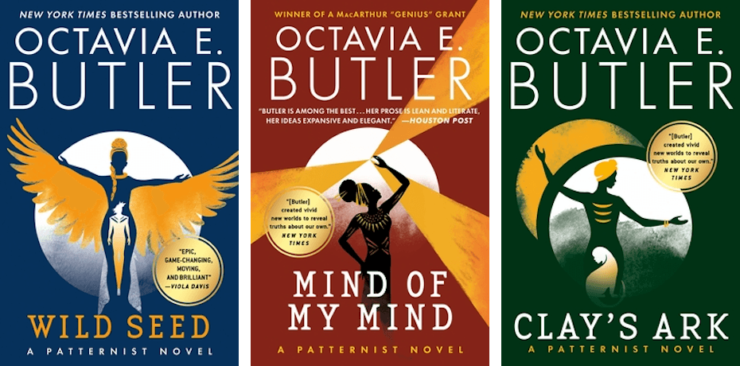
(Patternmaster, 1976; Mind of My Mind, 1977; Survivor, 1978; Wild Seed, 1980; Clay’s Ark, 1984)
Doro had a simple hobby that occupied him through the centuries of his immortality: carefully search out humanity’s tiny minority of psionically gifted mutants, encourage them to gather into communities, breed them to produce more mutants, and eat the minds of the tastiest examples. This project, pursued quietly over centuries, provided Doro with many fascinating discoveries, the second-to-last of which was that he had seriously underestimated his food’s potential for self-defense, and the last of which was that he was not at all immortal—merely very long-lived.
Having rid themselves of Doro, the mutants elevate humanity to the heights (starflight) and precipitate it into the depths (a civilization-shattering extra-terrestrial pandemic). Some mutants—the Patternists—find that they can bind the powerless to them with chains of pure mental power. Patternmaster is set in a time after this development, a time when the United States is long forgotten. It has been replaced by a patchwork of brutal feudal holds, surrounded by wilderness populated by packs of bestial Clayarks. All because thousands of years ago, Doro was peckish.
***
The Pelbar Cycle by Paul O. Williams
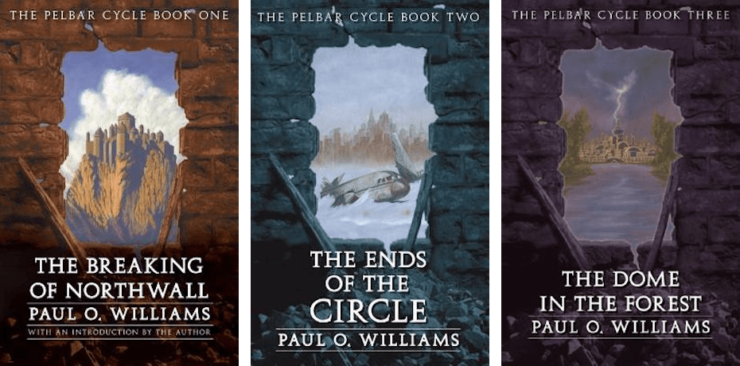
(The Breaking of Northwall, 1981; The Ends of the Circle, 1981; The Dome in the Forest, 1981; The Fall of the Shell, 1982; An Ambush of Shadows, 1983; The Song of the Axe, 1984; The Sword of Forbearance, 1985)
A thousand years after a great calamity left humanity on the brink of extinction, the human population has still not recovered. A few new cultures—the Pelbar, the Shumai, the Sentani, and many others—dot what was once the United States1, leaving much territory unoccupied. These communities are unfamiliar with and deeply suspicious of each other. Mutual hostility is the rule of the day.
The seeds of change originate in Pelbar, an alliance of city-states. A disastrous military expedition leaves its sole survivor, Jestak, convinced that the disparate peoples of North America must once have been the same people. Perhaps they could be united once again! This is a dream Pelbar’s conservative matriarchs would reject out of hand—and one that will, over the course of the series, have a profound effect on this future North America.
***
Rosinante Trilogy by Alexis Gilliland
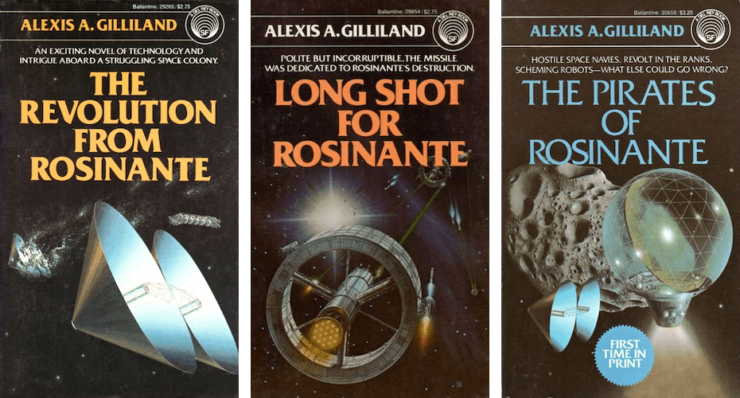
(The Revolution From Rosinante, 1981; Long Shot for Rosinante, 1981; The Pirates of Rosinante, 1982)
Crisis and political necessity led to the formation of the North American Union, encompassing the United States, Mexico, Canada, and a few other nations. The formative crisis having past, the Union is held together largely thanks to the determination of a cabal of conservatives, the Creationist Coalition. The central figures in the Administration are determined to not let their power and influence slip away. Their resolve proves the North American Union’s undoing.
The Administration is long on steadfast purpose, but short on foresight. Assassinating a Hispanic populist governor alienates Hispanic North Americans. Paranoid attempts to capture a suspected Old Regime sympathizer force the sympathizer to see the Union as his enemy. Each move undertaken to ensure the Union’s stability instead undermines it, with the inevitable result that the North American Union collapses into independent nation states.
***
Warday by Whitley Strieber and James Kunetka (1984)
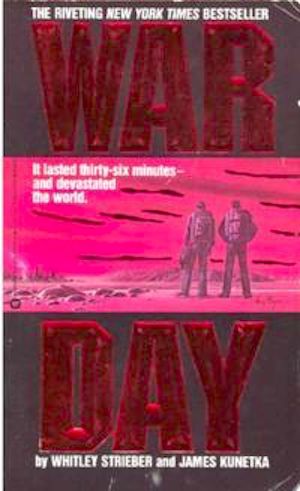
Fearing the United States would become invulnerable to Soviet weapons should America succeed in deploying the Spiderweb defense system, the Soviet Union struck. The attack killed millions of Americans and left US infrastructure in shambles. It was insufficient to prevent the US from retaliating in kind. In less than an hour, both nations were close to ruin.
Five years after the limited nuclear exchange, Whitley Strieber and James Kunetka set out to document post-Warday America. They find a nation divided against itself. Those regions lucky enough to be spared the worst effects of Warday could use their resources to rebuild the nation. Instead, the fortunate focus on regional security and prosperity, leaving the worst-off states to fend for themselves. Where exactly two snoopy writers fit into the new world order is unclear; it might very well be as prisoners spending their final days at hard labour.
***
Snow Crash by Neal Stephenson (1992)
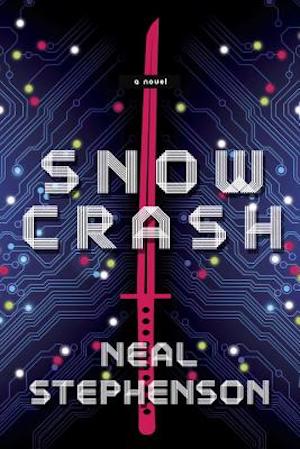
Faced with a world-wide economic crisis of seemingly unprecedented extent, the United States government did the only responsible thing it could do. It threw its hands up in baffled despair and graciously absolved itself of any responsibility to govern. There arose a quilt-work of microstates, each governing in accord with its own idiosyncratic ethos. The result no doubt offers less security to its inhabitants than did the old United States, but nobody could deny that it is an entertaining hotchpotch.
When he is not playing in the virtual reality known as the Metaverse, hacker Hiro Protagonist delivers pizza for the Mafia (just one of America’s exciting new assortment of governments!). Hiro unwisely takes possession of a data packet called Snow Crash, misapprehending its true nature. The product of rediscovered ancient cognitive-linguistic knowledge, Snow Crash can bluescreen people unfortunate enough to be exposed to it. Saving the world from weaponized language is above Hiro’s paygrade. Nevertheless, he is stuck with the job.
***
Science fiction authors adore smashing the US into bits: I think they have fun drawing borders on blank maps of North America. Examples abound, but if I were to try to list them all, I would be here until Friday. Also, this is a five-item list, which by its nature is limited to five works. Curse you, grim tyranny of math! Feel free to use the comments below to mention the noteworthy works I’ve neglected.
In the words of Wikipedia editor TexasAndroid, prolific book reviewer and perennial Darwin Award nominee James Davis Nicoll is of “questionable notability.” His work has appeared in Publishers Weekly and Romantic Times as well as on his own websites, James Nicoll Reviews and the Aurora finalist Young People Read Old SFF (where he is assisted by editor Karen Lofstrom and web person Adrienne L. Travis). He is a four-time finalist for the Best Fan Writer Hugo Award and is surprisingly flammable.
[1]Canada, then as now, is “unknown territory.”










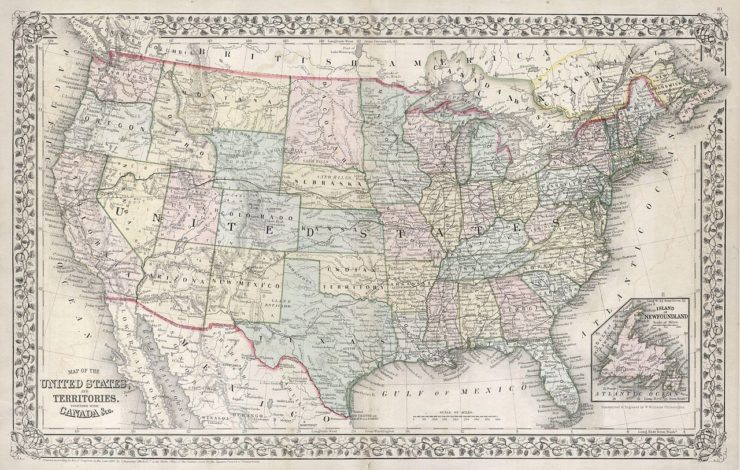
Terry Brooks – Shannara?
Two more for the list:
Hiero’s Journey by Sterling Lanier
Julian Comstock by Robert Charles Wilson
Fitzpatrick’s War, by Theodor Judson, comes to mind.
There’s Daniel Keys Moran’s Continuing Time, where the United Nations has saved the world by conquering it, and the grateful United States repays the gift of a survivable climate and enough food to eat with an unending stream of terrorists.
You’ve covered Dean Ing’s Quantrill series before, but that’s one that comes to mind.
I don’t know if the Emberverse series counts as a speculative vision- getting there from here requires a generous helping of Alien Space Bats- but it does imagine a collapse of the US (along with pretty much everywhere else) following a highly specific failure of technology, and the emergence and conflict/coalescence of various cultures and polities in the aftermath.
Heinlein’s vision of a breakdown after the formation of a religious dictatorship looks pretty prophetic right now.
See also “The Psalms of Herod” and “The Sword of Mary” by Esther Friesner. Set centuries after an ecocatastrophe, most of the US is an agrarian society composed of large clan-like families, and subject to a Christian-based cult that venerates King Herod’s Slaughter of the Innocents as a sacrament.
5: I thought about mentioning it but Streamlined America wasn’t quite what I had in mind.
As I recall, GDW’s original Twilight 2000 setting had various unpleasant regional governments attempt to exploit the war, experiments that by the time of 2300 AD had been reabsorbed back into larger nations.
“Alas Babylon” and “A Canticle For Leibowitz” both describe a post-apocalypse America. Presumably Canada (and Mexico) don’t exist, either.
I see what you did there . . .
I suspect things went very badly for Canada in the backstory to Canticle but we may have gotten off comparatively easily in Alas, Babylon, in as much as nuclear weapons were scarcer in those days and Canada being much more rural back then had fewer targets of strategic value.
I was a bit surprised when I discovered some unusual features in our CANDU reactors were not because Canadians are bold visionaries but fixes to get around shortcomings in our industrial abilities back when CANDUs were first being designed.
I just read Ben Percy’s the Deadlands. A retelling of Lewis and Clark’s expedition set in post apocalyptic America, with magic
The Masters of Solitude, by Marvin Kaye and Parke Godwin. We’ll not speak of the sequel (Wintermind), and a planned 3rd in the trilogy was never written. Just consider it a standalone and you’ll be fine.
I love Edgar Pangborn’s post-apocalypse books- Davy, etc.
Linda Bushyager’s duology, Master of Hawks and The Spellstone of Shaltus. Post-apocalytic, and I’m pretty sure set in North America.
Also, Claudia J Edward’s Bright and Shining Tiger, Eldrie the Healer, A Horsewoman in Godsland, and Taming the Forest King. The first two especially seem to be set in a regressed and Balkanised America.
David Foster Wallace’s opus Infinite Jest includes a US that has confederated itself by means not described with Mexico and Canada into the Organization of North American Nations (O.N.A.N.). It is usually regarded as lit’rature, so whether it qualifies as SFF is your judgement call.
And of course, Davy by Edgar Pangborn.
The Top Secret/S.I. roleplaying game line included a couple of supplements (F.R.E.E. Lancers and F.R.E.E. America) for a near-future setting with low-end superheroes; the USA in that setting had become balkanized into a number of regional alliances between states. I don’t think Top Secret was ever a particularly wonderful RPG, but that setting was kind of interesting.
Going to two different ends of the spectrun:
Heinlein’s Revolt in 2100 tale of revolution and recovery from the inevitable televangelist dictatorship.
Charlie Jane Anders All the Birds in the Sky – where super-science and magic clash.
The original Top Secret had an innovative hand-to-hand melee system not unlike Ace of Aces. Unfortunately, it could only handle two combatants. Apparently remembering that was more important than knowing where I set my glass down.
I remember a book that I thought was called Horns, and that I thought was written by Phillip Jose Farmer, but isfdb has nothing by that title…
A spaceship lands in America after a short trip to a nearby star. They find that America is in tatters. It still calls itself America but most technology has gone to seed (all over the planet, not just America). Biotechnology on the other hand is ascendant in America, as is a new fertility religion based on the worship of Columbia. (The Capitol dome in Washington is viewed as a breast figure, and the Washington Monument is of course a phallic symbol.)
The captain is captured and antlers are surgically attached; when active, these antlers produce a lot of hormones, causing uncontrollable lust in our captain …
I remember the back cover blurb started with the words “Antlers up, …”
Also I remember a corrupted game of baseball featuring a spiked ball.
@22, you’re not imagining it: it was by Philip Jose Farmer, but the title is Flesh.
The Horseclans series by Robert Adams.
Do other countries have long lists of books about their destruction? I’ve always wondered.
I really can’t think of any similar books set in other countries, I’m sure I’m overlooking something.
Anyway to add to this list, Ron Goulart’s “After Things Fell Apart” (1970?), is a minor, humorous, often overlooked, classic. As usual Goulart’s first sentences are good: “The money had just been piled on the desk when the earthquake came.”
I could come up with a similar list for the UK, I am sure.
I vaguely recall Through Darkest America, part of a series. There are many others in the post-apocalyptic vein, but I’m not sure if general savagery and collapse into tribalism actually counts as fractured States; like Amtrak Wars. I’m sure Norman Spinrad has done something that qualifies. In other mediums, Escape from L.A. and Martha Washington probably count. I was hoping a future season of Revolution would have shown more of this.
@28: re Spinrad, e.g. Songs from the Stars? IMO this is one of his lesser works.
Carrie Vaughn’s “Bannerless” novels also qualify, although they’re technically implausible: somehow a shattered country with little other tech can still synthesize and distribute a safe, reliable contraceptive drug.
@6: And part of the flavor of the Emberverse is the irony, both recognized in-story and unrecognized, of what people consider themselves to be and where readers (and some characters, in the early books) know they came from.
The Wiccan confederation that started as a Renfaire musician with a stage Irish persona and her coven…
The Dunedain Rangers who are simultaneously a functional polity and an expression of the serious psychological issues of somebody who never got the therapy she needed…
The feudal empire that was founded by an SCA geek with no conscience and some very specific interests…
The gang of bandits and kidnappers descended from a Boy Scout troop…
The rump USA that is helmed by a man who carries Captain America’s shield but in effect is the new Roman Empire…
S. M. Stirling’s series about the Emberverse in which the U.S. splits into many communities after electricity, petroleum, etc. stop working.
Lois McMaster Bujold’s Sharing Knife series seems to be in a post-US world, with added magic.
Ursula K. LeGuin’s City of Illusions which includes a trip overland from somewhere in the East or Southeast to the Black Canyon of the Gunnison where the alien rulers of Earth have their capital. Come to think of it, LeGuin’s Always Coming Home is in a post-USA Northern California.
I also recall a story — not title or author, alas — where the protagonist is looking for the lost land of Tizathy — as in, “My country, Tizathy…”
C.B. Lee’s Not your Sidekick stories take place in a post-America North America suffering recovering from ecological catastrophe. Some regions have fared better than others.
@25: The Chrysalids take place in Labrador with a side plot in New Zealand.
John Brunner’s Stand on Zanzibar!
and The Sheep Look Up and Shockwave Rider.
Not This August by C.M. Kornbluth doesn’t really break up the United States very much, except for dividing it into Chinese and Soviet occupation zones at the Mississippi River. Briefly mentioned and not obvious, since the narrative is centered in what seems to be upstate NY and Pennsylvania.
@16: Linda Bushyager’s duology is definitely set in North America, primarily in what was the northeast US/Great Lakes area. As I recall, the serial numbers place names are not so much filed off as lightly buffed. With respect to character names, she also dropped in a few Tuckerisms.
@27
Starting with John Christopher’s Sword of the Spirits Trilogy.
<blockquote>if I were to try to list them all, I would be here until Friday.</blockquote>
Is that a Heinlein reference?
Gosh, if all I need are five then I would begin with “Lucifer’s Hammer”. Yes, I know these two worthy’s have fallen prey to political correctness, still ( I typed corrected-ness but the robot over-ruled me).Poul Anderson’s “Orion Shall Rise” comes to mind as well as Haldeman’s “World’s” trilogy. R.A.Heinlein’s various works have already been mentioned. Long ago when I was at A.T.& T. there was an instructor that predicted a “regionalized” amalgamation of polities replacing the U.S.A. coalescing around their individual resources and cultural identities like the midwest and the great lakes, the northeast and their coastlines, the west coast from Baja up through British Columbia, the western border states from Arizona through Florida, etc. Not altogether impossible I suppose. In my opinion, David Brin wrote the definitive post-America novel with “The Postman”. Loved the book, hated the movie.
There’s being conquered or destroyed by a foreign country, but that doesn’t really count as altering the country’s civic apparatus or make-up, you just become part of the foreign country’s empire. Or being half conquered… I haven’t read “The Man in the High Castle”, which splits America between Germany, east of the Rockies (?), and Japan, west of wherever.
Most countries can imagine being conquered: “The War of the Worlds”, where Martians invade England (or Britain), is just in a genre of its time when usually Germany or France conquered England (or Britain). And European countries as of 2000 tend to consist of territories that used to be separate and conceivably could be again. I’ve voted for Scottish independence myself. Maybe next time the English should vote as well.
@27 the comic Stand Still Stay Silent is a post apocalypse setting with remaining settlements in Nordic countries. The characters go exploring in Europe. I don’t know if they’ve traveled beyond there because I haven’t caught up with the story in quiet a while.
“Chicago Red” by R.M. Meluch. Set a few hundred years after societal collapse from global climate change (about 1/4 of the former USA is now underwater, what had been New England is now an island, etc.), the current USA is now the “Kingdom of America” and is under control of an absolute monarchy, with an 18th-century-style social order, but with technology at around 1910-1920 level.
I’m thinking D. F. Jones’s Colossus (1966) fits this category nicely. Colossus is about two military supercomputers (one American and the other Russian) that team-up to rule the world on humanity’s behalf.
Another Poul Anderson is No Truce With Kings, and at a more distant chronological remove, Winter of the World.
Marge Piercy’s He, She, and It (1991. 1993 arthur c. clarke awrd winner), is set in a post- apocalypse north america, divided into multinational corporation ruled city-states, and everything else. bonus! it’s also a golem story of sorts.
I don’t know why my brain insists on shifting the publication date of Marge Piercy’s works decades before they actually came out but I wish it would stop. See also how I keep thinking Mists of Avalon came out in the 1970s.
It’s nice to see people posting about S M Stirling’s Emberverse! I have my issues with the writing and how lo-o-ong its gone on, but the series started as a fascinating exploration of catastrophe and recovery.
oh. and one more from another time.
Ernest Callenbach’s Ecotopia: The Notebooks and Reports of William Weston (1975), while a so so novel about a breakaway pacific northwest nation, was both prescient, and influential. there is an active movement to split off a nation to be called ‘Cascadia’ from the US and Canada which draws at least some inspiration from the novel.
> “My country, Tizathy…”
Cordwainer Smith’s “Meeya Meefla” might be more familiar under its original name, “Miami, Fla”
@32 The Sharing Knife books take place in a land that looks like North America, for sure, but it seems to be an alternate universe rather than ours later on. At least, if it is ours then you have to posit a lot of history between now and the apocalypse to get to the pre-apocalyptic world that is described (the Great Lakes surrounded by massive shining cities populated by the ancestors of the Lakewalkers, using something indistinguishable from magic).
I think the similarities between North America and the world of the Sharing Knife is because gods are notorious for cribbing off each other’s work, which is why so many fantasy worlds look like someone said “yeah, if I flip the map 90 degrees nobody will recognize my source”, they seem to focus on a limited range of governments, and most of them are populated by anatomically modern humans.
The gate to women’s country, Sheri S Tepper. It’s never made explicit, but I assumed there had been a nuclear war at some point in the past.
Earth Abides by George Stewart
The Scarlet Plague by Jack London
I found Cory Doctorow’s recent Walkaway a very challenging book about the decline and melting away of the US in its current iteration.
I’m surprised i haven’t seen N.K Jemesin’s Broken Earth trilogy.
Another is Piercy’s A Woman On The Edge of Time
And then also Rebecca Roanhorse’s books
@35: Stand on Zanzibar does not involve a breakup of the US; in fact, it has at least two additional states, Puerto Rico (IIRC) and something Pacific with enough islands that it might be intended to be the Philippines. The others also assume a unitary US — socially fragmented (and with part of California underwater) in the case of The Shockwave Rider, but not divided politically.
@48: I was wondering if anyone would bring up Ecotopia; I didn’t because it’s one piece broken off rather than a general collapse. Whatever the name, it’s unrealistic — the rural inhabitants of northern California and non-western Oregon and Washington have less in common with greater San Francisco than does LA (which is excluded). Callenbach handwaved this in Ecotopia Rising (one of our host’s dislikes), but not convincingly.
@30’s list reminds me of Paxson’s Westria series, which IIUC take off on various 1970’s/80’s SCA personalities in its portrayal of the west coast broken up into a number of kingdoms after some unspecified collapse that also lets magic loose. (My recollection is that this is not simply a geographical coincidence such as is argued for the Sharing Knife books.)
Vernor Vinge’s The Peace War posits a fragmented US under a world government that tries to keep a monopoly on its chief weapon by repressing research; this being a Vinge novel, the noble libertarians of course defeat this dire scheme. Kevin O’Donnell’s War of Omission is a bit more plausible: the US is fragmented by a portable device that can remove blocks of space from reality instead of merely time-freezing them like the bobbles, but the residents of New Haven (where the device was premiered) have enough experience and imagination to defeat the lead US general in Europe when he tries to take charge. Both of these are set shortly after the breakup, unlike many of the examples cited above.
@56: I read the first book some years ago and am weak on details; what did you see in it that it happened on Earth rather than some random planet with humanoid inhabitants and horrible ?tectonics?
With a really nasty side-effect: for SCIENCE! reasons, people forget all about the contents of the volumes cast out of space-time. This becomes very confusing for people, particularly after someone erases Washington.
@56/58: NK Jemisin has said repeatedly that the planet in The Broken Earth trilogy is not our Earth.
@26 This was actually a delightful recurring theme for Goulart throughout the 70’s, as his roguish protagonists would hoodwink the Duke of Rhode Island or canoodle with the Princess of Lower Missouri or whatnot. Goodreads actually has a Fragmented America series listed, although I don’t remember other common elements in the books they have listed there, and there are other books and short stories with the same background.
A book that I’m surprised didn’t get more notice in the last few years is J.G.Ballard’s Hello America.
Featuring a 45th President of the United States who is an insane germophobe, holed up in his casino. Who, as one character points out “wants to make America great again”.
Published in 1981.
Jack McDevitt’s “Eternity Road” suggests itself, as well as Stephen Vincent Benet’s short story “By the Waters of Babylon.”
Staring balefully at me, because I didn’t notice it on a nearby shelf: C. M. Kornbluth’s The Syndics. The alleged U.S. govt. is now a group of pirates and saboteurs on the coast of Ireland; New York City and environs belong to the Mafia, but Buffalo is in the territory of a Chicago-based Irish mob. (Other parts of the US aren’t discussed.) Unlike most post-division stories, tech is in good shape: there are high-speed monorails and fast nuclear-powered freight ships.
And Damon Knight’s Hell’s Pavement (aka Analogue Men) shows the US broken up among commercial syndicates — Gepro, Umerc, Conind, etc. — as a result of some bright boy’s idea to offer a sampling of goods free for a year in return for people taking a brain-twist which makes them buy only the offering syndicate’s products. Knight was not shy in his contempt for post-WW2 capitalism.
Spider Robinson”s Night of Power — the breakup, per se, comes at the end of the novel. The nascent nation to be ruled by Blacks and other PoC consists of the states of New York and Pennsylvania.
(When asked why New Jersey wasn’t included, the revolutionary leader replies that that state is Mafia territory.)
I would be remiss if I did not also suggest the Hunger Games series.
American War by Omar al Akkad is STUNNING and one of the few books I have actively nagged my friends and family to read.